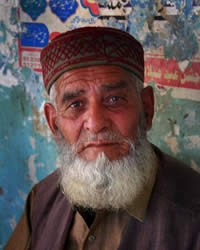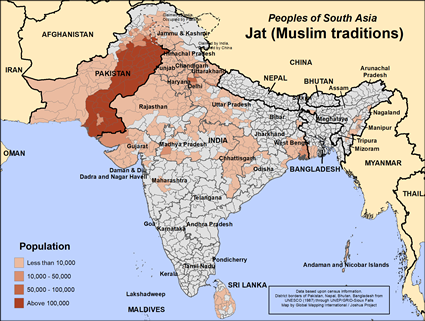The Jat people are a historical Indo-Aryan tribal group native to the Punjab region. We do not know when the Jat people established themselves in the Indian desert. By the 4th century they had spread to the Punjab. The Jats rose to prominence following the 1669 Jat uprising against Mughal rule, and they ruled various princely states throughout the 18th century. After 1858, under the British Raj, the Jats were known for their service in the Indian Army, being categorized as a "martial race" by the British, specifically in the Jat Regiment, the Punjab Regiment and the Sikh Regiment.
Jat people have a history of being brave and ready fighters. They are fiercely independent in character and value their self-respect more than anything, which is why they offered heavy resistance against any foreign force. The Jat lifestyle was designed to foster a martial spirit. Whenever they lost their kingdoms, Jat people retired to the countryside and became landed barons and the landlords with their swords girded round their waists. They would draw the sword out of the scabbard at the command of their panchayat (village leader) to fight off invaders.
In 1965, the United States opened new avenues for Asian peoples from places like India to work in America. It took a couple of decades, but by the end of the 20th century there were many South Asians migrating to the United States to start businesses or to work in the emerging tech industry. Muslim Jats who migrated to the US are small in number, but they do not necessarily stick with the same roles as other South Asian communities.
A smaller number of South Asians came to America to work in the agricultural sector. Jats were already among India's agricultural experts, and they were willing to fill in agricultural roles that Americans would not take. Others entered the trucking industry or the high tech world.
Traditionally, Jat Muslims have married others from their own community. With a drastically different cultural environment, Jats are in the process of modifying this. Who is a legitimate marriage partner? Does one marry for love, or do you have an arranged marriage with someone from India?
In India, Muslim Jats had a joint family system where large, extended families lived under the same roof. This was already starting to change in India, but the changes became even faster for those living in the United States. Muslim Jat family members become less dependent upon one another. Some, however, live within close proximity of one another.
They are Sunni Muslims who believe that the supreme God, Allah, spoke through his prophet, Mohammed, and taught mankind how to live a righteous life through the Koran and the Hadith. To live a righteous life, you must utter the Shahada (a statement of faith), pray five times a day facing Mecca, fast from sunup to sundown during the month of Ramadan, give alms to the poor, and make a pilgrimage to Mecca if you have the means. Muslims are prohibited from drinking alcohol, eating pork, gambling, stealing, slandering, and making idols. They gather for corporate prayer on Friday afternoons at a mosque, their place of worship.
The two main holidays for Sunni Muslims are Eid al Fitr, the breaking of the monthly fast and Eid al Adha, the celebration of Abraham's willingness to sacrifice his son to Allah.
Sunni religious practices are staid and simple. They believe Allah has pre-determined our fates; they minimize free will.
Muslim Jats are going through major cultural changes in the United States. Who are they as a community? What is their identity? Jesus has good answers, but will they listen, or consider this to be an intrusion on their culture?
Pray for a movement of Jesus to heal and strengthen Muslim communities in the United States.
Pray for Muslim Jat people to understand and embrace that Jesus wants to bless their families and neighborhoods.
Pray for Holy Spirit anointed believers from the Muslim Jat community to change their society from within.
Pray for a movement in which the Holy Spirit leads and empowers Jat disciples to make more disciples.
Scripture Prayers for the Jat (Muslim traditions) in United States.
https://en.wikipedia.org/wiki/Jat_Muslim
| Profile Source: Joshua Project |











